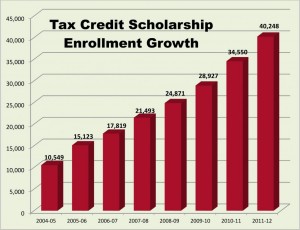 Idaho: State education offficials approve the American Heritage Charter School, which will emphasize American history, patriotism, money management and free market economics. (Idaho Statesman)
Idaho: State education offficials approve the American Heritage Charter School, which will emphasize American history, patriotism, money management and free market economics. (Idaho Statesman)
Florida: Demand continues to surge for the state's tax credit scholarship program, as the chart at left shows. (Tampa Bay Times' Gradebook blog). The number of charter school teachers in the state tops 10,000, more than double the number from five years ago (redefinED).
Mississippi: Former Florida Gov. Jeb Bush encourages Mississippi officials to follow Sunshine State education reforms, including vouchers and charter schools. (Associated Press)
Washington: A parents group forms to fight a ballot initiative to bring charter schools to the state. (The News Tribune)
Georgia: Debate heats up over a proposed constitutional amendment that would allow the state to authorize and fund charter schools. (Atlanta Journal Constitution)
Louisiana: The ACLU threatens to sue a charter school for policies banning pregnant girls from classrooms and requiring girls suspected of being pregnant to submit to a pregnancy test. (Associated Press)
Maine: Applications are withdrawn for two proposed on-line charter schools, but the groups behind them say they'll be back next year. (Kennebec Journal)
Utah: State education officials discuss additional financial and academic accountability measures for charter schools. (Salt Lake Tribune)
New York: State education officials will consider seven new charter schools in Queens, including one with a Chinese-based curriculum and mandatory martial arts training. (New York Daily News)
California: A former charter school administrator, fired after allegedly ordering his staff to cheat on standardized tests, is paid $245,000 in a settlement. (Los Angeles Times)
Editor’s note: Washington state is one of only nine states that don’t have charter schools. But voters can change that in November if they approve Initiative 1240, which will allow up to 40 charters statewide over five years. Chris Eide, who heads a Seattle-based ed reform group called Teachers United, tells redefinED in this emailed Q&A that it’s the students who struggle the most who will benefit if voters say yes.
 This is the fourth time Washington voters will go to the polls to vote on charter schools. They said no the first three times. Why will this time be different?
This is the fourth time Washington voters will go to the polls to vote on charter schools. They said no the first three times. Why will this time be different?
The last time voters looked at the option of charter schools in our state was eight years ago. Over that time, we have been unable to significantly address the needs of our struggling students. Moreover, the families of those students are often without high-quality options that can adapt to and address the needs of their children. Additionally, over the past eight years, high-performing charter schools across the country have demonstrated success for struggling students. Families in 41 other states have this option now, and Washington voters are faced with an easy decision to help struggling students.
Why does Washington state need charter schools?
Like other states, Washington has had a difficult time addressing the needs of struggling students. In some schools, nearly 40 percent of students are dropping out and far too many who do graduate are not prepared for college or their career. Public charter schools would be an option that will allow those students and families to attend a school that might better address their needs. If we hope to have more of our students graduating high school prepared for life after K-12, we are going to need all of the high-quality options that we can get.
You pointed out in a recent Seattle Times column that Initiative 1240 will only allow high-performing charters. How is that defined? And why did you stress that distinction? (more…)
 The number of instructional personnel in Florida charter schools more than doubled in the past five years and topped 10,000 for the first time last year, according to state data requested by redefinED.
The number of instructional personnel in Florida charter schools more than doubled in the past five years and topped 10,000 for the first time last year, according to state data requested by redefinED.
Between the 2007-08 and 2011-12 school years, the number climbed from 4,900 to 10,707, the Florida Department of Education figures show. The vast majority are classroom teachers, but “instructional personnel” also include guidance counselors, media specialists, school psychologists and other professional staff.
The growth is more evidence of an underplayed dynamic in debates over school choice and education reform: Teachers, like parents, are increasingly choosing alternative educational options.
Florida is among the leading states in the number of charter schools and students enrolled in them. Since the 2007-08 school year, the number of charter schools in Florida has risen from 358 to 518; the number of students, from 105,239 to 179,940. Over the same period nationally, charter school enrollment grew from 1.3 million to more than 2 million, according to data from the National Alliance for Public Charter Schools.
The number of charter school teachers in Florida still pales in comparison to the number in traditional public schools. The number of instructional staff last year, in both the charter and traditional sectors, fell just shy of 190,000 last fall, according to DOE. That included 168,135 classroom teachers.
The Miami-Dade school district, the state’s biggest, had the most charter school teachers within its boundaries last year (2,085), followed by Broward (1,615), Polk (840), Palm Beach (710), Hillsborough (649) and Lee (631).
The number of online K-12 teachers is also growing fast in Florida. In the 2007-08 school year, Florida Virtual School had 424 full-time teachers. Last year, it had 1,175.
FVS began in 1997 with seven.